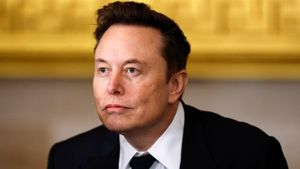U.S. President Donald Trump and Nvidia CEO Jensen Huang held an important meeting at the White House on January 31, 2025, focusing on the future of artificial intelligence (AI) policy and trade, amid rising competition from the Chinese startup DeepSeek. This meeting came on the heels of DeepSeek’s significant impact on the U.S. tech market, leading to considerable losses for Nvidia, which is heavily reliant on the U.S.-China tech relationship.
During the meeting, Trump characterized the conversation positively, stating, "I can't say what's gonna happen. We had a meeting. It was a good meeting." His comments, reported by Reuters, underscored the uncertain yet pivotal nature of U.S. AI policies as they pertain to competition from beyond American shores.
Huang, the CEO of Nvidia, expressed gratitude for the discussion, noting, "We appreciated the opportunity to meet with President Trump and discuss semiconductors and AI policy." According to Nvidia, the conversations centered on the importance of bolstering U.S. leadership in technology and AI, highlighting concerns over tightening export controls as they relate to advanced AI chips.
DeepSeek has made headlines recently, becoming the most downloaded app on Apple's App Store, raising alarms within the U.S. tech sector about lagging behind its competitors. The advancements made by DeepSeek—which uses significantly less computing power compared to American tech companies’ offerings—have spurred fears of declining American dominance, with the company’s recent success resulting in Nvidia's stocks dropping dramatically, wiping out approximately $600 billion of its market value, as reported by industry analysts.
Considering the rising tensions, the U.S. government is poised to impose stricter regulations on AI chip exports, especially targeting Nvidia’s H20 chips meant for the Chinese market. These regulations, part of broader efforts to maintain technological supremacy, could severely affect Nvidia's business since China remains its largest customer, contributing as much as $12 billion from AI GPU sales in 2024.
While the meeting emphasized cooperative innovation, there are brewing concerns of geopolitical ramifications as voices from both the U.S. and China weigh the need for increased technological self-reliance. A notable shift may occur if the Trump administration moves forward with tariffs on imported chips, as stated by Trump. "Eventually we’re going to put tariffs on chips," he remarked, placing additional pressure on Nvidia, which depends on components primarily imported from Taiwan and elsewhere.
Interestingly, reports suggest the timing of Obama’s and Trump’s administrations may overlap concerning discussions on restricting chip exports to China. Under Biden’s administration, restrictions were placed on Nvidia's H100 chip sales, prompting the company to design lower-performance alternatives to maintain market access—such as the H800 and H20. Over time, this competitive strategy has intensified, especially with the emergence of DeepSeek.
A recent analysis from The Financial Times also makes it clear the meeting’s agenda had been fixed prior to DeepSeek's recent breakthroughs. Analysts speculate whether it is possible to control or reinstate technology export policies with the growing power of such Chinese firms. The tug-of-war reveals significant uncertainties for American policymakers as they tread the delicate line between ensuring national security and supporting domestic industry.
U.S. lawmakers, including those on the House of Representatives Select Committee on China, have begun to call for more stringent export restrictions, citing developments involving strategic adversaries, which could harm Nvidia's market performance even more.
China remains resolute; experts note this country’s domestic advancements—levels of AI development facilitated by innovations independent of high-end Nvidia chips—pose long-term challenges to U.S. tech primacy. Xiang Ligang, director-general of the Information Consumption Alliance, warned, "From an industrial perspective, U.S. sanctions have instead accelerated the rapid development of China's domestic industries."
The conversations between Trump and Huang suggest diverging paths: one prioritizing the U.S. technological lead, the other seeking to cement business opportunities amid restrictive policies. For Huang, the precarious balance between maintaining market access to China and innovatively leading cannot be understated as Nvidia navigates these turbulent seas of international trade and technology.
Overall, the discussions at the White House spotlight the broader strategy of U.S. tech governance and the fierce competition for AI leadership, where both nations strive for dominance at the frontier of technology. Moving forward, the outcomes of these policies and discussions will not only affect individual companies like Nvidia but also shape the entire narrative of global technology competition.



